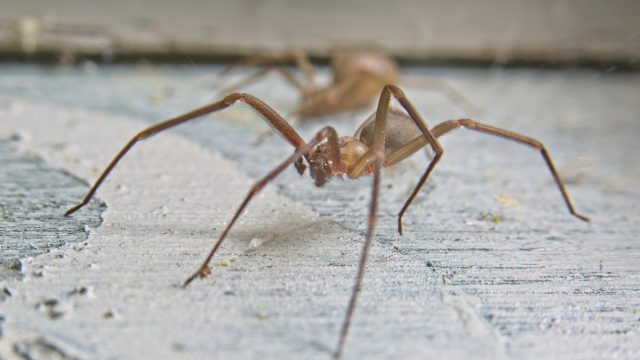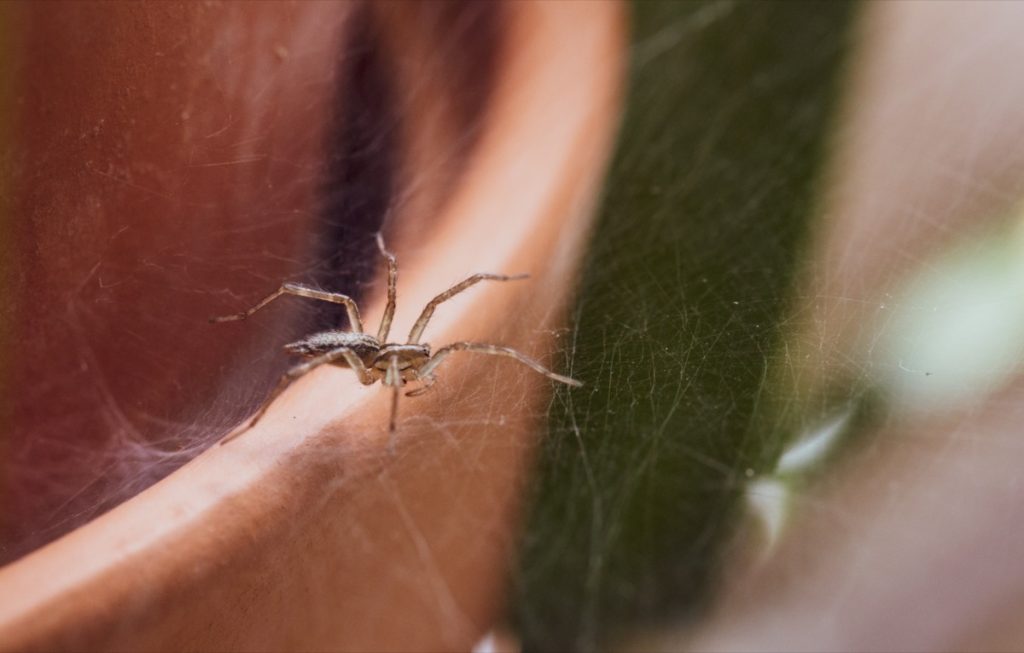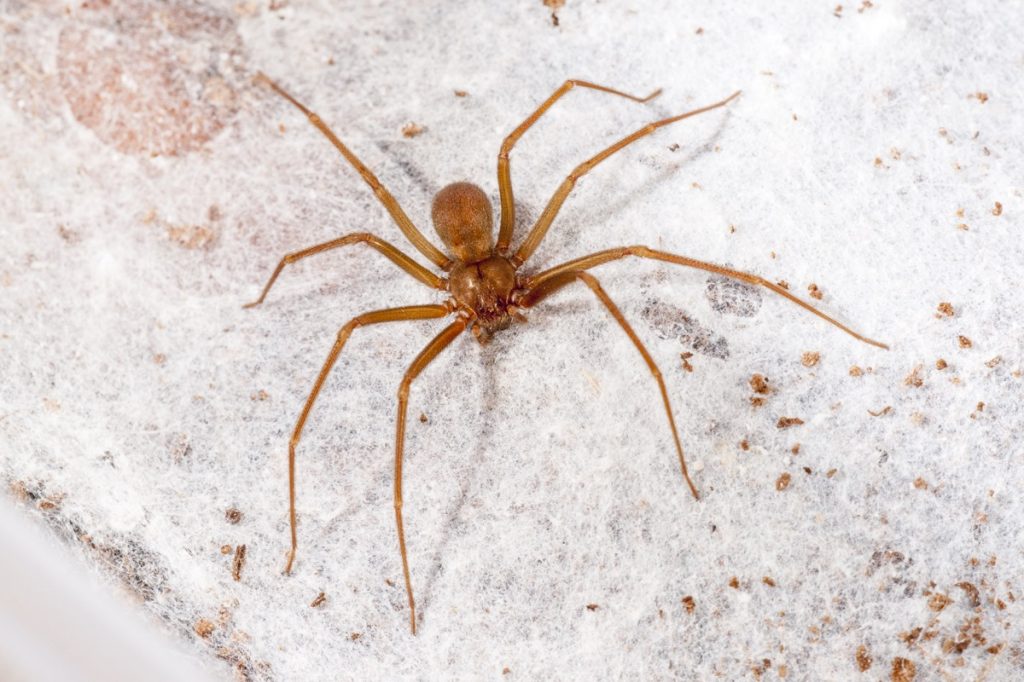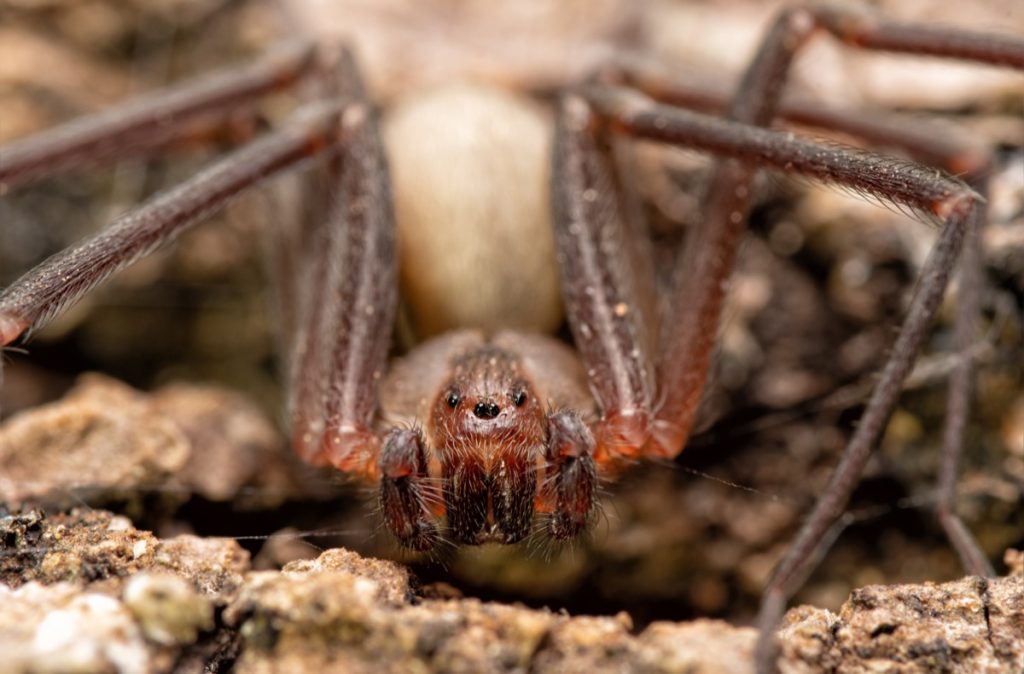If You Live Here, Watch Out for These Venomous Spiders That Cause Disfiguring Bites

Like snakes, spiders have a complicated relationship with the humans they happen to live alongside. For many people, the thought of finding one weaving a web in your home is enough to send them running—despite the fact they’re likely taking care of other more annoying or unhealthy insects like flies and mosquitos. But arachnids are also like snakes in that some can be venomous, which can pose a risk if they happen to make their way into your living space.
And now, authorities are warning residents in some areas to watch out for certain venomous spiders whose bite is so bad it can disfigure their victims. Read on to see how you can avoid any run-ins with this arachnid.
READ THIS NEXT: If You Keep This on Your Bed, You May Be Attracting Spiders, Experts Warn.
Certain habits or design choices might attract spiders to your home.

No matter how hard you try to keep your home tidy, there’s always a decent chance a spider will find its way inside one way or another. Since they’re hunters and don’t scavenge for food like traditional pests, having other bugs around can make them a more common sight. Some experts point out that installing bright exterior lighting can act like a beacon by drawing in the smaller insects that arachnids love to eat. From there, they can sometimes find small holes in screens, window frames, and walls to work their way into your living space.
Once inside, spiders are more likely to make themselves at home if they’ve got plenty of places to hide. Houseplants can provide the kind of space they love since they are rarely disturbed or touched by humans. They can also get cozy in the dusty areas under your heavy furniture like beds, sofas, chairs, and couches, where piles of clutter can give them the solitude they crave.
And while most arachnids that take up residence in your home are likely to be completely harmless, there’s one species that could result in a painful encounter.
One type of venomous spider has a painful bite that can leave permanent scars.

The change in seasons can often mean changes around the house as decorations come up, outdoor furniture gets stored for the winter, and warm-weather items get swapped out of storage for their cold-season counterparts. But as you’re taking out your favorite winter sweater from the closet for the first time in months, you might also be disturbing an arachnid with a painful bite.
According to the Missouri Department of Conservation (MDC), venomous brown recluse spiders live up to their name by stashing themselves away in very low-traffic areas like basements, behind furniture, and in attics. But the arachnids are also fond of hiding in stored-away clothing and linens, which creates the potential for a bite if they’re not shaken out before use. And unfortunately, this can lead to a pretty painful injury that could leave a permanent mark.
“Their bites can produce nasty, slow-to-heal lesions that leave unsightly scars,” Jerome Goddard, PhD, a professor of medical entomology at Mississippi State University’s Department of Biochemistry, Molecular Biology, Entomology, and Plant Pathology, told Newsweek.
RELATED: For more up-to-date information, sign up for our daily newsletter.
Reactions to the spider’s venom can vary from person to person.

In many cases, humans who get bit by a brown recluse may not notice anything at all at first. But within eight hours, some will begin to notice redness and tenderness where they were bitten, according to the MDC. Others might eventually develop chills, nausea, or fever. And while they are very rarely fatal, the wound itself can become far worse.
“Brown recluse bite reactions may vary from no reaction at all, to a mild red wound, to a terrifying rotting flesh wound,” Goddard told Newsweek.
While most bites usually stop with inflammation and heal without medical attention, roughly 10 percent can cause moderate to significant tissue damage and scarring, according to Rick Vetter, a retired research associate of entomology at the University of California, Riverside, per LiveScience. Anyone who develops this type of reaction should seek medical attention immediately, according to the MDC.
Here’s how you can reduce your risks of a brown recluse spider bite.

According to Vetter, the brown recluse spider has a relatively wide native habitat through the southern and midwest U.S. that spread through Alabama, Arkansas, Kansas, Louisiana, Missouri, Mississippi, Oklahoma, and Texas, as well as parts of Georgia, Illinois, Indiana, Iowa, Kentucky, Nebraska, Ohio, and Tennessee, per LiveScience. However, he emphasizes that while it’s possible to see one outside these states, “it is highly unlikely that you have a recluse spider.
Fortunately, brown recluse bites are a relatively rare occurrence. This is not only because the spider tends to live in secluded areas but also because its fangs are relatively short and can’t easily pierce human skin. Instead, most bites result when the arachnid gets pressed against the skin, such as when it’s stuck inside clothing or when a sleeping human rolls on top of one, according to the MDC.
You can significantly reduce the risk of getting bitten by clearing your property of any wood piles or other trash, especially if it rests near your house, according to the Integrated Pest Management Program at The University of California, Berkeley. Anyone living in brown recluse spider territory should also consider pulling their beds away from the wall, not using bed skirts, and removing any messes or cluttered storage underneath their mattress to avoid a nighttime nip. You should also shake out any clothes, towels, sheets, or blankets before using them, whether they’ve been removed from storage or just lying on the floor.